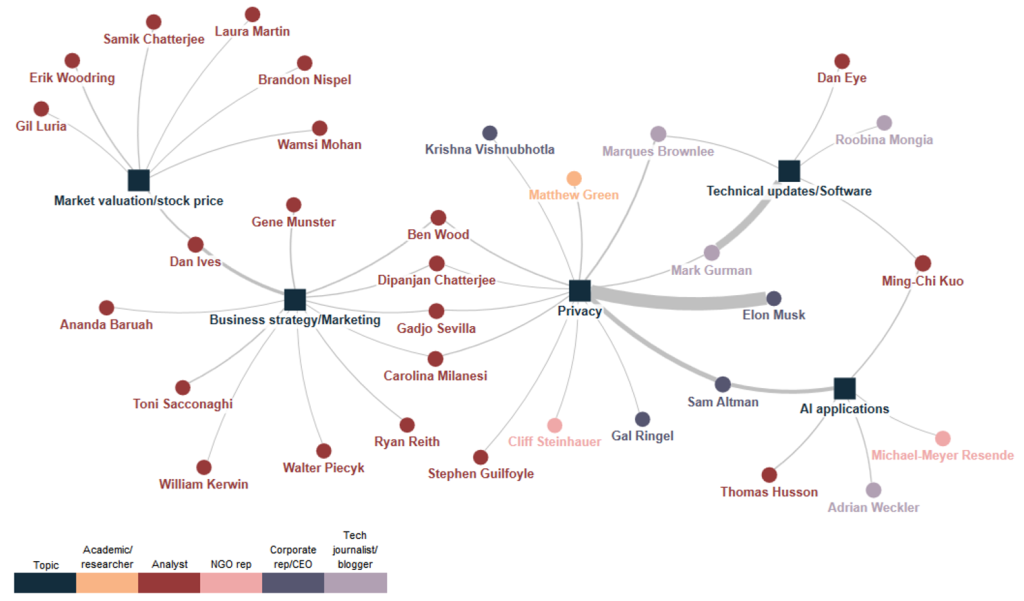Apple’s long-awaited entry into the AI race at its 2024 Worldwide Developers Conference has ignited a fierce debate in the tech world. The unveiling of Apple Intelligence (AI), a new generative AI suite that harnesses user data from Apple devices to provide automated assistance, has been met with both skepticism and optimism. While some view this as an unconvincing move that exposes how Apple’s emphasis on privacy has made it a laggard in the AI space, others see it as the dawn of consumer-friendly AI that effortlessly integrates into users’ daily lives.
Private AI?
For years, Apple has tried to make privacy a core part of its brand and a key differentiator among competitors.
At its 2024 Worldwide Developers Conference, it finally crossed the AI Rubicon by debuting Apple Intelligence (or AI), a new generative AI suite that draws off the data on a user’s phone, tablet, or computer to offer automated assistance.
This became evident from our message analysis of Apple’s announcements as part of our analysis of 779 English-language articles on WWDC published last week.
However, critics contend that Apple’s “private AI” narrative rings hollow, arguing that maintaining user privacy while integrating AI is a near-impossible feat. Apple’s partnership with OpenAI, a company notorious for its privacy concerns surrounding ChatGPT, has drawn sharp criticism from influential commentators like Elon Musk and privacy experts. They question Apple’s ability to safeguard user data once it is handed over to OpenAI, with Musk stating that Apple has no clue what’s actually going on once they relinquish control of the data.
This made Elon Musk the most influential commentator in the Privacy topic of the WWDC discussion, where commentators such as Matthew Green, associate professor of Computer Science at Johns Hopkins University, Forrester principal analyst Dipanjan Chatterjee, TheStreet Pro’s Stephen Guilfoyle also expressed their doubts.

This led to privacy actually becoming the main issue of criticism against Apple in the media debate, both in mainstream outlets like Wall Street Journal and BBC, as well as in tech publications like Techradar, PC Magazine, Techcrunch, Cnet and Engadget:
It didn’t escape journalists’ attention that like rivals, Apple has had to offer a cloud-based solution for some functions.
This comes with unique challenges and although Apple has created its own private cloud for many functions, the partnership with OpenAI for ChatGPT marks a new direction for Apple which has previously been reluctant to partner for core technology.
A second-mover advantage?
It’s true that Apple has lagged behind peers like Google, Microsoft and Amazon in the generative AI race. These rivals rushed to create hype, often before getting all the details right, resulting in releases ranging from dysfunctional to downright dangerous.
In contrast, Apple held off from integrating generative AI into its flagship consumer products until now. CEO Tim Cook framed this as an intentional delay to “apply this technology in a responsible way”. Critics argue this stance is at odds with the data-hungry nature of AI.
However, Apple’s hesitance could highlight a strength, not a weakness. By waiting for the technology to mature and competitors to stumble, Apple can learn from their mistakes. It’s a classic “second-mouse” strategy: let others traverse the obstacles first before swooping in with a more refined, user-friendly offering.
This approach has served Apple well with other innovations like smartphones, tablets, and smartwatches. Android devices and Windows tablets beat the iPhone and iPad to market, but Apple’s later entries ultimately dominated by delivering superior design and user experience.
With AI, Apple is betting it can repeat this playbook. By focusing on privacy-preserving on-device AI, ecosystem integration, and signature Apple design, it aims to make artificial intelligence into “Apple Intelligence” – AI that is more intuitive, personal and trustworthy.
Of course, challenges remain in reconciling AI with Apple’s privacy principles. But if successful, Apple’s distinctive AI strategy could become a key competitive advantage, not a liability caused by brand baggage. As the AI race shifts from hype to real-world utility, Apple’s second-mover approach could once again prove that it pays to be fashionably late.
